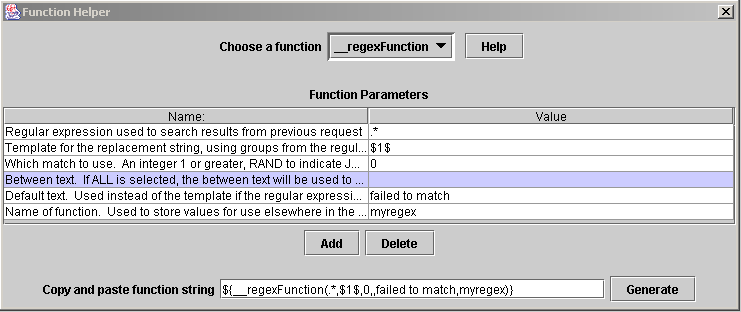|
About
download
Documentation
JMeter Resources
Community
|
|
14. Functions
|
JMeter functions are special values that can populate fields of any Sampler or other configuration
element in a test tree. A function looks like this:
${__functionName(var1,var2,var3)}
Where "__functionName" matches the name of an existing built-in or user-defined function.
Parentheses surround the parameters sent to the function. The actual parameters vary from function
to function. Functions that require no parameters can leave off the parentheses. The function itself
is wrapped in ${}.
|
14.1 What can functions do
|
There are two kinds of functions: user-defined static values, and built-in functions.
User-defined static values allow the user to define variables to be replaced with their static value when
a test tree is compiled and submitted to be run. This replacement happens once at the beginning of the test
run. This could be used to replace the DOMAIN field of all HTTP requests, for example - making it a simple
matter to change a test to target a different server with the same test.
This type of replacement is possible without functions, but was less convenient and less intuitive.
It required users to create default config elements that would fill in blank values of Samplers. User-defined
functions allow one to replace only part of any given value, not just filling in blank values.
With built-in functions users can compute new values at run-time based on previous response data, which
thread the function is in, the time, and many other sources. These values are generated fresh for every
request throughout the course of the test.
|
|
|
14.2 Where can functions be used?
|
A user-defined function can be written into any field of any test component. Some fields do not allow random strings
because they are expecting numbers, and thus will not accept a function. However, most fields will allow
functions.
Built-in functions can be written into any field of non-controller test components. This includes
Samplers, Timers, Listeners, Modifiers, Assertions, and Config Elements.
|
|
|
14.3 Writing the function string
|
User-defined functions take the form:
${varName}
. In the TestPlan tree element, a two-column table
of user-defined values is kept, matching up variable names with static values. Referencing the
variable in a test element is done by bracketing the variable name with '${' and '}'.
Built-in functions are written in the same manner, but by convention, the names of built-in
parameters begin with "__" to avoid conflict with user value names
*
. Some functions take arguments to
configure them, and these go in parentheses, comma-delimited. If the function takes no arguments, the parentheses can
be left out. A further complication for argument values that themselves contain commas is that the value
should be escaped as necessary. Thus, if you need to include a comma in your parameter value, escape it like so: '\,'. JMeter provides a tool to help you construct
function calls for various built-in functions, which you can then copy-paste. It will not automatically escape values for you, since functions can be parameters to other functions, and you should only escape values you intend as literal.
|
*
If you define a user-defined static variable with the same name as a built-in function, your static
variable will override the built-in function.
|
|
|
|
14.4 The Function Helper Dialog
|
The Function Helper dialog is available from JMeter's Tools menu.

Function Helper Dialog
|
Using the Function Helper, you can select a function from the pull down, and assign
values for its arguments. The left column in the table provides a brief description of the
argument, and the right column is where you write in the value for that argument. Different
functions take different arguments.
Once you have done this, click the "generate" button, and the appropriate string is generated
for you to copy-paste into your test plan wherever you like.
|
|
|
|
|

